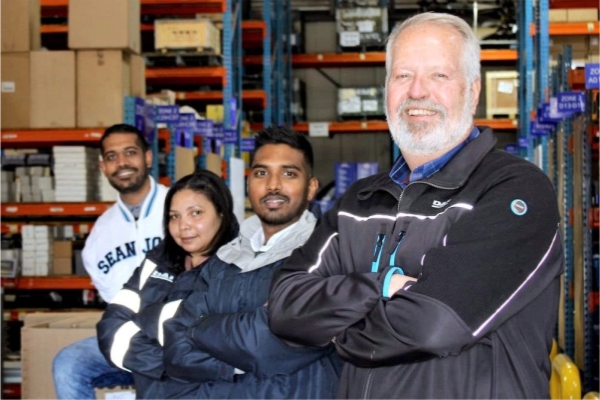When a business’s focus is operational excellence in handling and distributing over 30 000 parts lines per month – or 90 tonnes of parts – it’s easy to fixate on the stats and the volumes moved. What is often overlooked are the people behind the supply of parts, and the numerous processes that must be followed to ensure that daily targets are met in order to meet customer expectations. Beyond the parts counter
Beyond the parts counter
Hans Roos, Head of Supply Chain for Babcock Africa, says that consistency and quality of supply to ensure uptime are the main requirements of their truck and equipment customers.
Roos, who has been in the industry for 38 years and has experience of managing major supply chain distribution, joined the company in April 2021. He was tasked to assist in setting up a national parts distribution centre to enhance the efficiency of Babcock’s supply chain process across all the company’s operations, in line with Babcock’s Purpose and Principles.
He says that aftersales (including service and parts supply) is often not at the forefront of an organisation. However, he is emphatic that it is a vital link in supporting customer centricity for the various quality brands that Babcock represents as a group, and it is therefore imperative to create a symbiotic relationship between sales and aftersales.
“Aftersales is where customer service really comes into play,” says Roos. “While the sales division sells the trucks and machines, the aftersales team can influence a future purchase. If a customer experiences poor service and poor availability, they are unlikely to buy another truck or machine from Babcock.”
He adds that the success of a parts distribution centre comes down to three things: having the right part, at the right place at the right time, and this hinges on having a reliable team.
“A distribution warehouse is a bit like a vending machine; when a customer has decided what they want, they press a button and expect the product in their hand immediately. However, there’s a lot happening behind the scenes once a customer has placed an order,” says Roos. “We must ensure the right parts are in stock, the right part is picked, packed, shipped, and delivered to the right place, on time. All these separate functions need to work together to ensure the customer is satisfied and continues to support our genuine parts brands.”
Over the last few months, Roos and his team have successfully integrated all aftersales products related to DAF Trucks into the centralised supply chain, which make up approximately one fifth of the components stocked by the national supply chain warehouse. Based on volume, 80% of DAF genuine parts are shipped from DAF Eindhoven via sea freight. In cases where parts are required on an urgent basis, they are ordered and sent via air freight.
“We’re a team of just under 30 people, but each person plays a vital role, from the supervisors and warehouse staff to the security guards and cleaners, so we need to keep absenteeism to a minimum. The key to this is to make people feel valued. They are the core of the division, and without them, we would not be able to deliver on our customers’ expectations, on a 24-hour vehicle off-road standby basis.
Unlike parts for site-based machinery which can be pre-planned, it is almost impossible to predict where a truck will break down. While we aim to fulfil routine orders within 24 hours from order placement, there are instances that require swift action, for example if a truck should need replacement parts while carrying livestock, fresh produce or urgent medical supplies. Our team plays an important role in ensuring that our customers can continue doing their day-to-day functions safely and efficiently.”
Roos says that to achieve this, one needs people who are motivated, understand the processes, and understand customers’ expectations. This is where Babcock’s Purpose and Principles have come to the fore, which emphasise kindness by creating safe, inclusive environments where everyone feels they belong, and making time to help others grow and develop.
During the process of setting up the centralised supply chain warehouse, people within the company were given the opportunity to apply for supervisory roles to support empowerment in the business. “This move has paid off, as they’re doing an excellent job,” says Roos. “It is gratifying to see this unique cocktail of people taking pride in what they do and working together to fulfil their roles that contribute significantly to the bigger picture of the organisation.”
Communication and collaboration between the different divisions has been crucial to the success of the centralisation process, shifting away from silo thinking towards collaborative interactions. Through this, the company has been able to streamline parts distribution for DAF Trucks and its construction equipment brands, thereby reducing costs and improving service levels. “We’re achieving service levels of 90% on DAF parts, but we’re constantly looking at ways to becoming the benchmark in the industry,” says Roos. “We’re also looking at ways of placing parts closer to our customers, by increasing our inventory at the various DAF dealers across the branches where the real demand is generated.”
In partnership with Triton Express, Babcock’s national distribution centre supplies all its branches across the country, as well as the SADC regions in which Babcock has a presence as a trusted supplier of trucks, equipment and after sales support.
The next phase may see Babcock’s other businesses being incorporated into the centralised supply chain warehouse where it makes financial or business sense to support Babcock’s fundamental purpose of creating a safe and secure world together.

